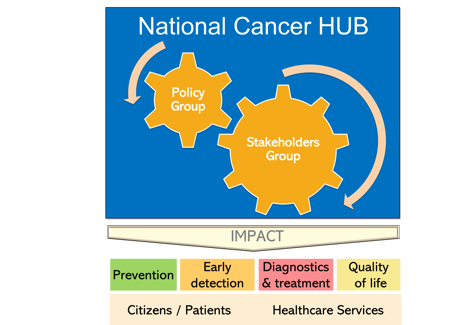Towards an anti-cancer culture: The role of National Cancer Hubs (Guest blog)
On average, close to 1.3 million people in Europe die of cancer every year and additional 2.7 million people are newly diagnosed with the disease. The pressure exerted by cancer on European health systems expenditure is estimated to exceed €199 billion (EU-27 plus Iceland, Norway, Switzerland, and the United Kingdom) and it is predicted to increase even further in the coming years [1-Link].
To improve the fight against cancer in the European area, the European Commission has defined two major initiatives, (i) the Europe's Beating Cancer Plan (EBCP) [2-Link] and the (ii) Mission on Cancer [3-Link]. A strong and coordinated action between all Member States and a stakeholders in the coming years will dictate the success of the implementation of these ambitious initiatives. As shown by the COVID-19 pandemic, unilateral health and research initiatives may lead to a fragmented, less productive, responses. Therefore, Member States should learn from positive collaboration experiences and synergies to engage into international efforts in health, research and beyond to tackle cancer.
Dialogue and collaboration between relevant organisations and stakeholders are key to the development and implementation of meaningful initiatives. It is crucial to align expectations of researchers and healthcare professionals with needs of society, including patients and employers, and to consider these in governmental strategies for Health, Research and beyond. A true societal culture against cancer can only be achieved with the support and commitment of all sectors, not just healthcare and research.
Aware of the importance of national, regional and local structures to coordinate the implementation of European initiatives, the European Commission has recently opened a call for proposals with a clear goal to support the creation of national cancer mission hubs (NCMH) and a network to support to the implementation of Mission on Cancer in all member states and associated countries [4-Link]. National Cancer Mission Hubs should coordinate and support the implementation of cancer mission-related activities at national, regional and where relevant at local levels through the development of synergies with actions under Horizon Europe and Europe’s Beating Cancer Plan and through the promotion of policy dialogues on cancer with citizens, including patients, and national, regional and local stakeholders. An integrated, multi-stakeholders’ movement against cancer must be developed in the coming years to support the goal of improving the lives of more than 3 million people by 2030.


